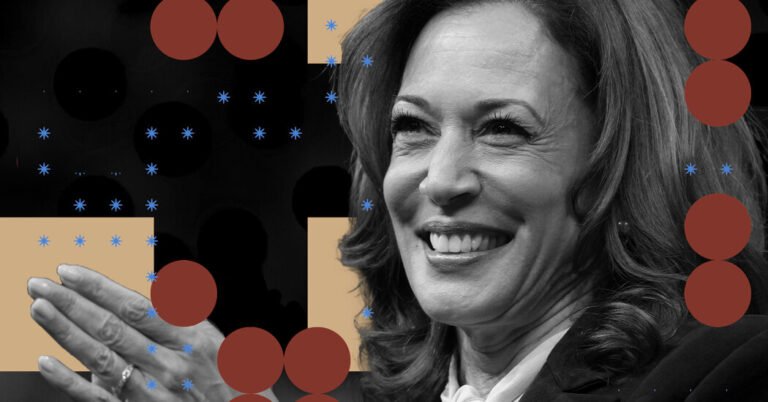
At the Democratic National Convention this week, Kamala Harris faces a challenge. She must understand and speak to voter concerns on major issues like the economy without being downbeat. She must highlight her experience as President Biden’s right-hand woman without aiding Republicans in their efforts to link her to voter frustrations with Mr. Biden’s presidency.
Essentially, she must explain why she is the right person to tackle the problems of the next four years without being defined by the past four years.
A recent ABC News-Washington Post-Ipsos poll shows why Ms. Harris needs to seize that opportunity this week. Donald Trump maintains sizable leads over his opponent when voters are asked which candidate they trust more to handle the economy, inflation and immigration. If there’s any question about what issues the campaigns think will define the race in battleground states like Georgia, look no further than the ads being aired in the Atlanta media market: a flurry of spots about Ms. Harris’s record on the economy and immigration from both campaigns.
Yes, despite all her momentum, Ms. Harris has work to do on these issues, and normally it would be a bad sign for voters to say they think you aren’t very influential in the administration in which you serve. Yet in an environment in which voters, just a few months ago, were much more likely to say they’d benefited from Mr. Trump’s policies than from Mr. Biden’s, the ability to chart your own course as a candidate is valuable, and Ms. Harris has this blessing in disguise: In the ABC-Post poll, only 33 percent of Americans said that Ms. Harris has had “a great deal” or “a good amount” of influence over the Biden administration’s economic policies, and just 39 percent say the same of Ms. Harris on immigration. So far, Republicans’ efforts to highlight Ms. Harris’s early role as Mr. Biden’s point person on tackling drivers of migration across the southern border don’t seem to have had the kind of effect they want — probably need — it to.
Ms. Harris remains, for the moment, something of a blank slate to many voters. According to the latest CBS News-YouGov polling, more than one in three voters say they don’t know what Ms. Harris stands for, far more than say that about Mr. Trump. (The Democratic Party itself seemed to be behind the times, putting out a platform just before the convention that repeatedly referred to a Biden second term.)
Indeed, the most recent shifts in the race seem to be much more about voters’ changing attitudes toward Ms. Harris than any re-evaluation of Mr. Trump. In the ABC-Post poll, Mr. Trump has actually gained a point since July, when he was at 43 percent in a multicandidate field including Biden; today he is at 44 percent in a field that includes Ms. Harris and others. Nevertheless, Mr. Trump went from a slim one-point margin over Mr. Biden to a three-point deficit to Ms. Harris, with the vice president seemingly absorbing a chunk of voters who may have previously been undecided or leaning toward a third-party candidate.
Younger voters and independents in particular are big movers here, showing quite a bit of a shift toward Ms. Harris relative to where they stood in the Biden-Trump race. It isn’t a stretch to think they would have more malleable opinions of Ms. Harris given these groups are known to be somewhat less plugged in when it comes to political news. To the extent there are voters who are still up for grabs, look to these groups for movement as Ms. Harris becomes more of a known quantity.
This week, the Democratic Party will have de facto control of the airwaves and with it a chance to control the narrative about what kind of president Ms. Harris might be. Republicans, meanwhile, are up against a very tight deadline to define Ms. Harris on their terms, considering that in some states the first absentee ballots start going out to voters in just a few weeks.
Odds and Ends
Democrats have that Obama 2.0 feeling. Republicans have felt strongly and positively about their candidate for some time; Democrats, not so much. But the switch-up at the top of the Democratic ticket has led to a surge in enthusiasm among Democratic voters, according to Pew Research. With the notable exception of protests against the war in Gaza, anyone looking for signs of disagreement or dissent at the convention is likely to be disappointed.
But is it 2016 all over again? This weekend, Mr. Trump’s running mate, JD Vance, hit the airwaves to complain about “fake polls.” His argument is that some polls are overstating Ms. Harris’s lead over Mr. Trump, and that “the media” uses these polls to depress Republican voter turnout. I don’t find his argument persuasive; why were these same supposedly nefarious outlets happy to put out data showing just how poorly Mr. Biden was polling mere weeks ago?
But I don’t dismiss the suggestion that the polling industry could be on track for another historic miss. Mark Davin Harris of the political polling company Coldspark has looked under the hood at the data in some recent surveys and is worried that the surge in Harris enthusiasm, especially among highly educated Democratic voters, is causing normal weighting practices to fall short when it comes to ensuring representativeness in some surveys.
Kristen Soltis Anderson, a contributing Opinion writer and Republican pollster, is the author of “The Selfie Vote: Where Millennials Are Leading America (and How Republicans Can Keep Up).”
The Times is committed to publishing a diversity of letters to the editor. We’d like to hear what you think about this or any of our articles. Here are some tips. And here’s our email: letters@nytimes.com.
Follow the New York Times Opinion section on Facebook, Instagram, TikTok, WhatsApp, X and Threads.